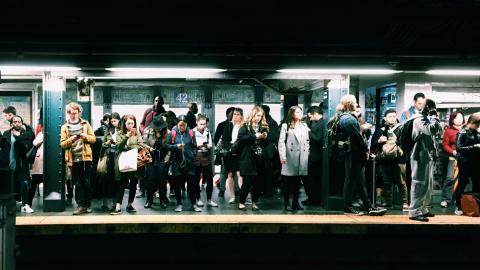How the pandemic could finally democratize commutes

Credit: Eddi Aguirre on Unsplash
What responsibilities do employers have in terms of supporting their workforce’s commute to work?
There are great examples of efforts from employers to facilitate commutes to work, but the same mobility perks are much harder to offer for small business employers, non-traditional employers, contract workers and the self-employed.
For those groups who don’t enjoy employee commute perks, transportation and access to jobs is yet another hurdle, especially during COVID.
In some tech companies, employers are offering stipends for their employees to deck out their remote working areas. Other firms are incentivising a return to work by offering additional mobility benefits that ease the struggle of a commute.
In fields like investment banking, it is not uncommon for employees to receive an allowance for a taxi home after working long hours. Ironically, these individuals could easily afford an Uber ride themselves. For most employees working for an hourly rate the same benefits often do not apply, and many essential workers in the food and healthcare industries fall into this camp.
Through the outbreak of the pandemic, employers have answered these questions, albeit inequitably. Some identify a responsibility to support their workforce commute. Recognizing their responsibility of giving their workforce the opportunity to protect their health and that of their loved ones, others still have helped non-essential employers establish alternatives to office commuting over the last year.
While some firms have attempted returns to the office, the understanding in many workplaces remains that employees are entitled to choose the risks to which they’re exposed in order to get to work, even if there might be costs for collective productivity.
COVID has removed employees’ needs for self-funded commutes, democratizing access to work. This historic shift triggers a broader conversation point: whose responsibility is it to ensure that there is affordable access to employment, if affordable is defined in terms of dignity, safety, finances and time?
The commute as part of an obstacle to employment
Questions abound surrounding the commute and responsibility: Should the public sector help subsidise commuting solutions for underserved communities, to help combat unemployment? Should employers take the same care of their lower-waged employees as they do of their higher earners? Should contractors guarantee mobility support for the essential workers they provide, so they can continue delivering their services regardless of circumstances? Security guards would be one such example.
The ease or difficulty of a commute impacts worker performance, worker health and the length of stay of employees in the company. Commuting is an unspoken part of the job without any financial, social or environmental recognition. For many there is no financial returns for commutes; it’s just the energy time sink you invest in to keep a job.
Environmentally, it’s the unacknowledged pollution and traffic sink. But as a society we can choose not to perpetuate this broken reality.
When funding commutes is in the financial interest of the firm
In some industries, it can be relatively easy to quantify the costs of having an employee become unable to perform overtime. Associates in law firms, for example, track billable hours.
Without that allowance for a late-night taxi — i.e. if they just declared they were not comfortable getting back to their neighborhood via public transport late at night and therefore decreased their hours — employee bonuses and overall compensation would be proportionately lower, as would the revenue produced by the firm.
Some associates bill over $1,000 an hour. Some law firms then charge a fee on top for a supervising associate to review and approve the work. The math is simple: a $30 ride and a $50 dinner can yield a huge ROI for the firm.
The same math becomes much more complicated for the janitor who comes in at 10pm so he can clean the office before the next morning without bothering the managing partners or distracting high-paying customers. But isn’t this person equally entitled to not jeopardize his safety, “just” so he can keep his job — financial gain for the firm, or otherwise?
Looking ahead
COVID-19 has created a crystal clear understanding of the risks everyone is taking each time they step into an indoor space. And yet, in spite of the use of mask wearing to get on with our lives to some degree, the world has largely reached a consensus that COVID-19 was dangerous enough to justify not forcing commutes to the office.
The world now has an enormous learning opportunity. In re-evaluating the commute, we see we might have spent decades missing opportunities for greatly increased ROI for global economic development via corporate reform. We’ve taken the first steps towards democratizing commutes: let’s stay on track.
Reprinted with permission of the World Economic Forum. Read the original article.





